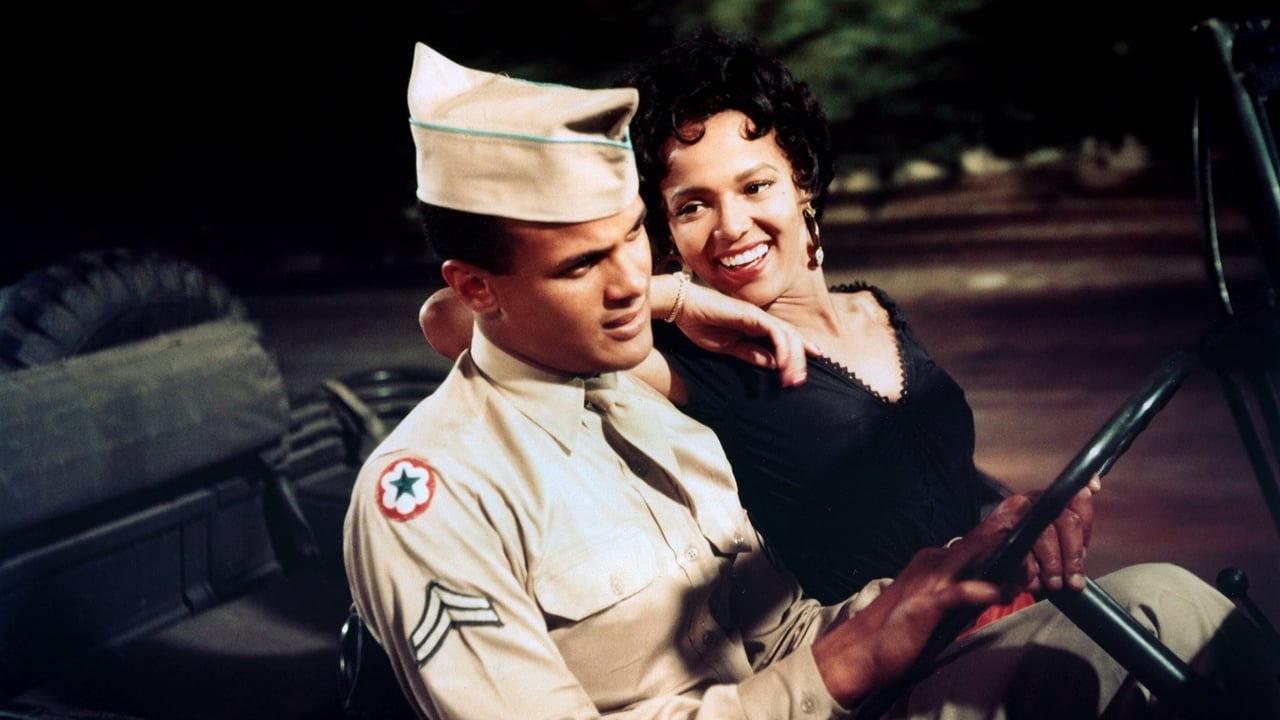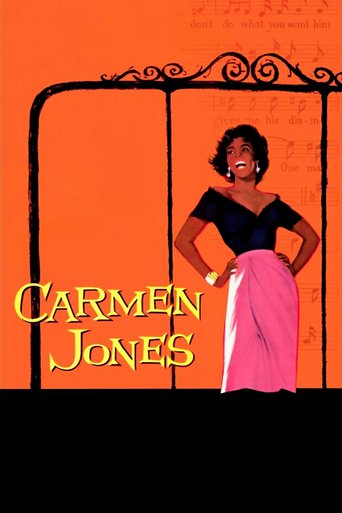Dorathen
Better Late Then Never
ChicDragon
It's a mild crowd pleaser for people who are exhausted by blockbusters.
Skyler
Great movie. Not sure what people expected but I found it highly entertaining.
Darin
One of the film's great tricks is that, for a time, you think it will go down a rabbit hole of unrealistic glorification.
Antonius Block
In this adaptation of the opera, Dorothy Dandridge is a firecracker, and Harry Belafonte is not bad himself. He plays a straight-laced GI who is engaged to a sweet young woman (Olga James), but finds himself seduced by Dandridge when he's charged with taking her in to authorities for fighting on the base. There are some scenes with over-the-top symbolism, such as Dandridge between his legs cleaning his uniform while he munches a peach, and it's pretty steamy stuff for 1954.Gradually we see Belafonte degrade himself, as Dandridge tires of him and moves out to another (a boxer played by Joe Adams). It's hard to feel good about Dandridge's character, but then again it's hard not to be mesmerized by her, and it's great to see a strong woman portrayed. In one scene she's baring her beautiful legs, and in another she's telling Belafonte that she "don't account to no man", and that love "don't give you no right to own me – there's only one that does, and that's me, myself." Hallelujah.It's a strong cast as well, including Pearl Bailey, and I considered a slightly higher rating, but knocked it down because of the voiceovers, which made several of the musical numbers a little less enjoyable for me. While true to the opera and maybe necessary because the music is challenging in places, it often sounded unnatural, which is a shame given Dandridge and Belafonte's singing ability. Still – a very good, entertaining movie.
ayreno
This modern re-working of Bizet's Carmen is a must-see. Carmen Jones retains Bizet's music while setting the story in the late 20th century). Dandridge owns this film with her wildly entertaining--and empathetic--portrayal of Carmen.I wish the cast had been able to (all) sing their own parts. The highlight for me was Pearl Bailey's big number when she is first introduced, but all of the songs are really well written to accompany Bizet's opera. Overall, I liked it a lot. A "race" movie that transcends race, and reminds that all people hurt the same way and laugh the same way. This is a sparkling example of a what a movie musical can be and how it can better its viewers while remaining impeccably entertaining.
Jackson Booth-Millard
From director Otto Preminger (Laura, Anatomy of a Murder), as is the tradition I might have heard the title somewhere before, but I recognised it from the book 1001 Movies You Must See Before You Die, so naturally I watched it. Basically it is an all black contemporary musical version of Georges Bizet's legendary opera Carmen, also based on the Broadway musical production. The story starts at an all black army camp where Cindy Lou (Olga James) has gone to see her fiancée Joe (Harry Belafonte), but their reunion is spoilt when Joe is ordered to take civilian parachute maker and man eater Carmen Jones (Oscar and BAFTA nominated Dorothy Dandridge) off the base. Carmen sets her sights on Joe, knowing his engagement and due to go into pilot training for the Korean War, and he does succumb to her charms, forgetting completely about Cindy Lou. Because Joe did not hand Carmen to the authorities he is put in prison, and while she waits she hangs around in Billy Pastor's jive café, where she meets besotted boxer Husky Miller (Joe Adams). She is initially uninterested, but her friends Frankie (Pearl Bailey) and Myrt (Diahann Carroll) convince her that she can't turn an invitation from Husky's manager to see him fight in Chicago. When Joe turns up quickly getting into a fight with Sergeant Brown (Brock Peters) for hitting on Carmen, she goes to Husky's training camp, where her friends try to convince her to forget about Joe and "go with the money" by staying with Husky. Later, Carmen gets her cards read by Frankie, and with the Nine of Spades representing death, she is convinced she will die soon, so she decides to dump Joe for the luxurious lifestyle with Husky. Cindy Lou comes back looking for Joe, but he is still in love with Carmen and rejects Cindy Lou with disdain. The night of Husky's big fight has come, and Joe turns up trying to convince Carmen to take him back, and when she rejects him the cards prediction turns out to be to true when he kills her. Also starring Roy Glenn as Rum Daniels and Nick Stewart as Dink Franklin. Dandridge is fantastic as one of the ultimate Femme Fatales of the cinema, the story is good modernised conventions of opera, the songs (especially Dat's Love, Beat Out Dat Rhythm on a Drum, Stan' Up and Fight, and Dat's Our Man - music is also the Overture) have been written around the great classical music, it is a very watchable musical melodrama. It was nominated the Oscar for Best Music for Herschel Burke Gilbert, and it was nominated the BAFTA for Best Film from any Source, and it won the Golden Globe for Best Motion Picture - Musical/Comedy. It was number 52 on The 100 Greatest Musicals. Very good!
James Hitchcock
I am not really an opera buff, so I have not taken a lot of interest in films based upon operas; the few I have seen have not really convinced me that this is an art-form that transfers well to the cinema screen. "Carmen Jones" is different, largely because the opera on which it is based is different. Georges Bizet's "Carmen" was controversial when it was first produced in the 1870s, largely because it did not fit into either of the two then accepted categories of opera. Its spoken dialogue, working-class characters and merry tunes were more reminiscent of comic opera than of grand opera, but its plot, centred upon sexual passion, jealousy and murder, is far from comic. In some respects the work even in its original form is closer to a Broadway musical than it is to traditional ideas of opera, so it was not surprising when, in 1943, Oscar Hammerstein turned it into just that.Hammerstein kept Bizet's music and the basic outlines of his plot but provided new lyrics and updated the story from nineteenth-century Spain to America in World War II. In this version Carmen works in a parachute factory, and her lover (named Joe rather than Jose) is a GI with ambitions to train as a pilot. Most of the main characters have similar names to those in the opera; Carmen's friends Frasquita and Mercedes become Frankie and Mert (presumably a diminutive of Myrtle), Lillas Pastia is Billy Pastor and the bullfighter Escamillo becomes (a rather strained one this) the boxer Husky Miller. The one exception is Micaela who should by rights have been Michelle but instead becomes Cindy-Lou.The stage musical had one distinctive feature which is faithfully followed in the film; an all African-American cast. Although the film has far more actors than most stage productions would, there is not a single white face to be seen, not even as a minor character, not even as an extra in the crowd scenes. A times this can seem a bit unrealistic (are there really no white boxing fans in Chicago?) but the aim was presumably not realism but symbolism. In the 1950s Hollywood was still a very racist institution, with black actors generally limited to minor roles, often as servants or other working-class characters. Most films had all-white casts, even in situations where one might have expected to see some black faces. By making "Carmen Jones" with an all-black cast, the filmmakers were sending out a message, not only about the talents of black performers, but also about their unfair treatment within the film industry.Since her tragic early death from an accidental overdose, Dorothy Dandridge has become known as the "black Marilyn Monroe", and her performance here shows her to have been just as beautiful and at least as talented as Marilyn herself. She received a nomination for a "Best Actress" Oscar, something Marilyn never achieved. (She was the first African-American actress so nominated). This should have been the part that made Dandridge's career, but in fact she had to wait three years for her next film role. I doubt if any white Oscar nominee would have had that problem. Harry Belafonte, her co-star here, also appears in that film, "Island in the Sun". Oddly enough, although Dandridge and Belafonte were as well-known for their singing as they were for their acting, their singing voices are both dubbed in "Carmen Jones". Perhaps they were considered to be not "operatic" enough for their roles.Belafonte was not Oscar-nominated, but he is very good as Joe, making sympathetic a character who could easily have been seen simply as a self-destructive idiot. (Joe does, after all, sacrifice both his relationship with his loving sweetheart Cindy-Lou and a promising military career for the sake of a woman who eventually rejects him). Dandridge also has a difficult balancing act to perform, needing to make Carmen seductive and alluring but not so hard and amoral that she forfeits our sympathy altogether. (The film character is perhaps rather more sympathetic than her counterpart in the opera, a work that sometimes strikes me as being rather misogynistic in tone).Like a number of fifties musicals, "Carmen Jones" can today seem somewhat dated. Apart from the sterling contributions of its two stars, however, it does have one great advantage in its music; for a story that ends tragically there are a surprisingly large number of light-hearted, cheerful melodies. Even though he had been dead for nearly seventy years, Hammerstein had found in Bizet a collaborator even more gifted than Richard Rodgers. 7/10

